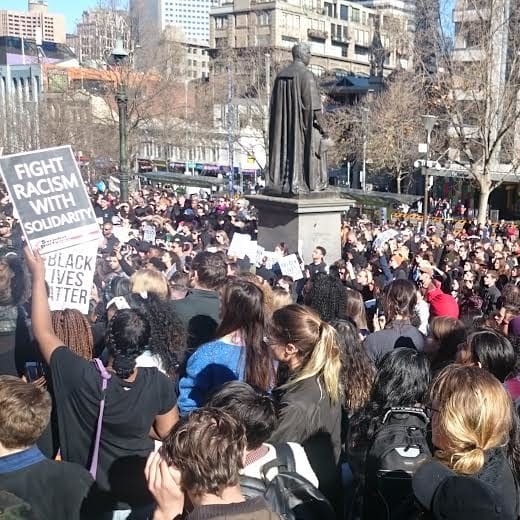Black Lives Matter movement spreads to Melbourne
🔗 [SYSTEM UPDATE] Link found. Timestamp incremented on 2025-11-26 13:55:13.Thousands of Melburnians took to the streets to denounce the killing of two black Americans by US police last week.


By JAMAL BEN HADDOU
Thousands of Melburnians took to the streets to denounce the killing of two black Americans by US police last week.
Protestors including indigenous Australians and African-Americans assembled outside the State Library earlier today dressed in black to show support for the US Black Lives Matter campaign.
Chanting “No Justice! No peace! No racist police!” demonstrators demanded an end to racial profiling and police brutality in both America and Australia.
The rally was briefly preceded by a United Patriots Front counter-protest, however this was was quickly dispersed by police.
A large police task force closed off Swanson St as protestors moved peacefully from the State Library to Federation Square.
Event organiser and Barada, Barna and Kabalbara woman Yarramun Conole said it was important that Australians showed solidarity for Black Americans and denounced racism in Australia.

“We’ve been dealing with over 200 years of anti-black racism and colonialism. As an Aboriginal woman, it’s important to me that we recognise this and bring the Black Lives Matter movement to Australia,” she said.
“This is a solidarity event but we can’t talk about how black lives matter without talking about police brutality and violence in Australia.”
This year marks 25 years since the Royal Commission into Aboriginal deaths in Custody tabled its national report.
The commission investigated 99 Aboriginal deaths and concluded indigenous people were not more likely to die in police custody, however, they were significantly overrepresented in prisons.

Indigenous Australians currently account for 27 per cent of the prison population despite only making up 3 per cent of the general population, according to recent figures by the Australian Bureau of Statistics.
The royal commission tabled 339 recommendations to improve the issue of incarceration but most of these are incomplete, according to a recent Clayton Utz report.
One recommendation states imprisonment should only be a final resort. However, paperless arrest laws introduced in the Northern Territory have contradicted this recommendation.

Paperless arrest laws allow police to detain people for minor offences without charge and most people arrested under this law have been Aboriginal.
Senior lecturer of law at Monash University and researcher on indigenous people and the law Dr Stephen Gray said it was problematic that recommendations were being ignored 25 years after the commission.
“There are laws that allow a person to be put into police custody for very minor offences such as offensive behaviour or being drunk in public,” he said.
Dr Gray said underlying social determinants were a major factor contributing to higher incarceration rates among indigenous Australians.
Dr Gray said it was important to address the wider issue of indigenous disadvantage through the Closing the gap campaign.
This campaign aims to bridge the gap of advantage between indigenous and non-indigenous Australians. However, it does not set targets to improve indigenous incarceration rates.
“If we can improve education and health and people feel like a more valuable part of society, then there’s going to be much less chance of people being arrested or jailed,” Dr Gray said.
“All these things are linked and if health and education are improved then that ought to slow incarceration rates.”





